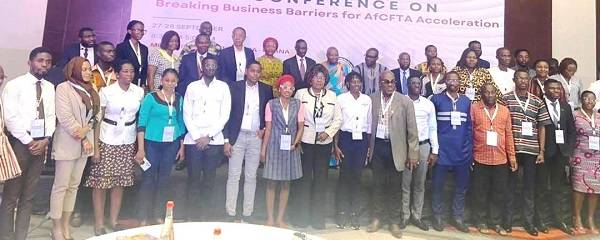
The Chief of Staff of the African Continental Free Trade Area (AfCFTA) Secretariat, Mr Silver Ojakol, says political will, collaboration and embracing of AfCFTA tenets were crucial to overcoming trade barriers on the continent.
According to him, the political commitment and collaboration would enable Africans achieve the just one per cent increase in trade on the continent, which would generate 70 billion dollars revenue, way higher than the 58 billion dollars given by donors as development assistance.
Mr Ojakol disclosed this at the opening of a two-day Small and Medium Enterprise (SME) conference, organised by Centre for Regional Integration in Africa (CRIA) and the African Capacity Building Foundation (ACBF), in Accra yesterday.
The SME conference which was in collaboration with the Ghana Institute of Management and Public Administration (GIMPA), with support from Afreximbank and endorsement from the AfCFTA was under the theme ‘Breaking business barriers for AfCFTA acceleration.’
It aimed at increasing awareness of the AfCFTA and its benefits for SMEs as well as to strengthen SMEs’ capacity to engage in intra-African trade.
Mr Ojakol said the journey to the implementation of the agreement was marked by a strong political will by African heads of state and government, and the enthusiasm of the private sector to change the destiny of the African people by making the continent an “economic powerhouse.”
“The AfCFTA is the first agreement in the world to demonstrate the political commitment and to have entered into force within a year of the signature of the agreement,” he added.
He said the AfCFTA provides opportunity for SMEs to build their capacity and to engage in intra-African trade while contributing to the success of the AfCFTA.
He urged the SMEs to take advantage of the AfCFTA to grow their businesses saying “there’s no AfCFTA without SMEs, therefore AfCFTA needs SMEs to make meaningful contribution to the economic development of the continent.”
The Executive Director of the CRIA, Professor Lehlohonolo Tlou, said over the past six decades after the establishment of the African Union, regional economic communities (RECs) and the AfCFTA, the continent’s intra-African trade was woefully low at 15-16 per cent.
“The reality is that Africa’s SMEs and private sector operators still ‘produce what Africa does not consume and consume what it does not produce,” she stated.
Prof. Tlou said the SME Conference formed part of CRIA’s Regional Integration Issues Forum (RIIF), a platform that contributes to raising awareness and building SME capacities to make well-informed choices and actions in support of AfCFTA acceleration of the production of goods and services that meet the consumption needs of the African people.
The Chairman of Afariwaa Group of Companies, Dr Nana Owusu-Afari, called for the removal of artificial national boundaries to ensure the free flow of goods and services for intra-African trade and the need for public and civil servants to be trained to help develop the private sector in Africa.
“In some countries, some of the public servants and government appointees are competitors to the private sector. They’ve their own companies or are agents of private companies. This becomes a barrier to the full development of the SMEs,” he added.
BY VIVIAN ARTHUR







